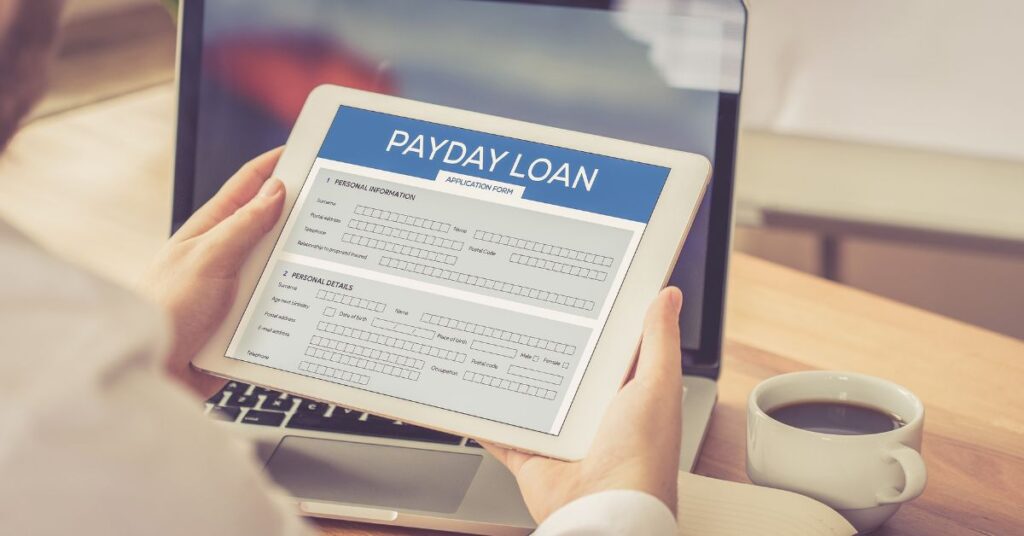
Payday loans are a common form of short-term borrowing designed to bridge the gap between paychecks. However, they often come with high costs and can lead to a cycle of debt if not managed properly. This article explores how payday loans work, their costs, and offers advice on debt management related to these loans.
What are Payday Loans?
Payday loans are short-term loans that people use to cover urgent costs until their next wage comes in. They are usually for small amounts of money. To get a payday loan, you show the lender that you have a job and a bank account, and then you agree to pay back the money when you next get paid.
These loans are easy to get but often have very high costs associated with them, making them an expensive way to borrow money. They should only be used for emergencies and when you are sure you can repay them on time.
How Payday Loans Work?
The Basic Process
Getting a payday loan is straightforward. First, you need to find a lender, which can often be done online. When you apply, you’ll need to show proof that you have a regular income, like a payslip, and provide details of your bank account. The lender will then tell you how much you can borrow and what it will cost you in fees and interest.
If you agree, you will set up a way to pay back the money on your next payday, either by a direct debit from your bank account or by a cheque you give to the lender.
Interest Rates and Fees
Payday loans are known for their high interest rates and fees. This can add up quickly if you can’t pay it back on time. The fees continue to grow if you extend the loan or miss the payment deadline. This makes payday loans one of the more expensive ways to borrow money. It’s important to check how much the loan will cost in total before deciding to proceed, to avoid any surprises when it’s time to repay.
The Costs Associated with Payday Loans
Comparing Costs
When looking at payday loans, it’s crucial to compare their costs with other types of borrowing. Payday loans often have a much higher Annual Percentage Rate (APR) than other credit options like personal loans or credit cards. This APR includes both interest and any additional fees, giving a true picture of the total cost. Understanding these differences can help you see how payday loans can end up being a lot more expensive, encouraging you to consider cheaper alternatives first.
Potential Financial Implications
Using payday loans can have serious financial consequences if not managed carefully. If you can’t repay the loan on time, the fees and interest quickly increase, making it much harder to clear the debt. This can lead to a cycle where you need to borrow more to pay off existing loans, worsening your financial situation.
Additionally, failing to repay a payday loan can damage your credit score, which affects your ability to borrow money in the future. It’s important to consider these risks before taking out a payday loan, ensuring you have a plan to pay it back promptly to avoid these potential pitfalls.
Alternatives to Payday Loans
Other Borrowing Options
If you need money quickly, there are alternatives to payday loans that are often cheaper and less risky. One option is a loan from a credit union, which usually offers lower interest rates and more flexible repayment terms.
Another choice could be a personal loan from a bank, especially if you have a good credit history. Credit cards can also be an option for short-term borrowing; they might offer interest-free periods if you manage to repay within that time.
Exploring these alternatives can save you from the high costs associated with payday loans and help maintain your financial health.
Non-Borrowing Alternatives
If you’re facing financial difficulties, consider non-borrowing options before taking out a loan. For example, you could try negotiating with your creditors to arrange a payment plan that spreads out your bills over a longer period, making them more manageable.
Additionally, seeking advice from a free financial counselling service can provide you with guidance and potentially identify government assistance programs you might qualify for.
Selling unused items around your home could also generate quick cash. These approaches can help you manage your financial needs without adding new debts, keeping your financial situation more stable.
Conclusion
While payday loans provide immediate financial relief, they come with high costs that can make them a risky choice. Considering alternatives and managing debts effectively are crucial steps for anyone facing financial difficulties. It’s important to approach payday loans with caution and be fully aware of their terms and conditions.
FAQs
How much can I borrow with a payday loan?
The amount you can borrow with a payday loan usually ranges from £50 to £1,000, depending on your income level and the lender’s policies.
What are the typical interest rates for payday loans?
Payday loans have significantly higher interest rates compared to other types of loans. The interest rates may vary from lender to lender.
Can payday loans affect my credit score?
Yes, payday loans can affect your credit score. Failure to repay a loan on time can result in a negative report to credit bureaus, lowering your credit score.
Remember, never travel without travel insurance! And never overpay for travel insurance!
I use HeyMondo. You get INSTANT quotes. Super cheap, they actually pay out, AND they cover almost everywhere, where most insurance companies don't (even places like Central African Republic etc!). You can sign-up here. PS You even get 5% off if you use MY LINK! You can even sign up if you're already overseas and traveling, pretty cool.
Also, if you want to start a blog...I CAN HELP YOU!
Also, if you want to start a blog, and start to change your life, I'd love to help you! Email me on johnny@onestep4ward.com. In the meantime, check out my super easy blog post on how to start a travel blog in under 30 minutes, here! And if you just want to get cracking, use BlueHost at a discount, through me.
Also, (if you're like me, and awful with tech-stuff) email me and my team can get a blog up and running for you, designed and everything, for $699 - email johnny@onestep4ward.com to get started.
Do you work remotely? Are you a digital nomad/blogger etc? You need to be insured too.
I use SafetyWing for my digital nomad insurance. It covers me while I live overseas. It's just $10 a week, and it's amazing! No upfront fees, you just pay week by week, and you can sign up just for a week if you want, then switch it off and on whenever. You can read my review here, and you can sign-up here!













 As you know, blogging changed my life. I left Ireland broke, with no plan, with just a one-way ticket to Thailand
and no money. Since then, I started a blog, then a digital media company, I've made
more than $1,500,000 USD, bought 4 properties and visited (almost) every country in the world. And I did it all from my laptop as I
travel the world and live my dream. I talk about how I did it, and how you can do it too, in my COMPLETELY FREE
Ebook, all 20,000
words or so. Just finish the process by putting in your email below and I'll mail it right out to you immediately. No spam ever too, I promise!
As you know, blogging changed my life. I left Ireland broke, with no plan, with just a one-way ticket to Thailand
and no money. Since then, I started a blog, then a digital media company, I've made
more than $1,500,000 USD, bought 4 properties and visited (almost) every country in the world. And I did it all from my laptop as I
travel the world and live my dream. I talk about how I did it, and how you can do it too, in my COMPLETELY FREE
Ebook, all 20,000
words or so. Just finish the process by putting in your email below and I'll mail it right out to you immediately. No spam ever too, I promise!
